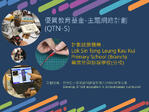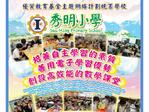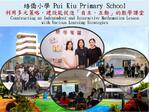Quality Education Fund Thematic Networks - Schools (QTN-S)
This programme is the continuation of the Professional Development Schools Scheme financed by the Education Development Fund. Schools with exemplary practices in learning and teaching and a good sharing culture will form a network with participating schools, focusing mainly on specific pedagogical themes to promote inter-school collaboration and professional exchange through various exchange activities. Integrating Coding to General Studies School-based Curriculum to Promote STEM Education (2021/22)
- Co-ordinator : Lok Sin Tong Leung Kau Kui Primary School (Branch)

To enhance General Studies teachers’ ability in designing STEM activities;
To assist teachers of the Participating Schools in integrating STEM education and coding in the General Studies curriculum effectively so as to improve the planning of school-based curriculum through the development of curriculum leadership;
To integrate computational thinking into General Studies curriculum through the application of Micro:bit;
To enhance teachers’ ability in designing “minds-on and hands-on science activities” so as to facilitate students’ learning of science concepts and science process skills;
To promote cross-school interaction and professional exchanges by establishing a cross-school learning community; and
To develop students’ computational thinking and problem-solving skills.
Quality Education Fund Thematic Network – Schools (QTN–S) Dissemination Seminar (2020/21)

In 2020/21 school year, QEF sponsored 17 secondary schools and primary schools to implement QTN-S, which covered different subjects and themes. The QTN-S has provided support to the participating primary and secondary schools and enhanced professional exchanges as well as professional capacity building to facilitate continuous development of schools.8 QTN-S dissemination seminars would be organized in the form of online live webinars from 16 June to 13 July 2021.
The Planning and Implementation of School – based Values Education (2020/21)
- Co-ordinator : Fung Kai No.1 Primary School

This QTN aims at promoting values education, assisting schools to develop school-based curriculum on Basic Law education, foster sharing culture for school-based curriculum planning and disseminate relevant experiences with all primary schools.
Nurturing Students with the Quality of Self-directed Learning, Fully Utilizing the Edge of e-Learning and Constructing Highly Effective Mathematics Lessons (2020/21)
- Co-ordinator : Sau Ming Primary School

To flexibly adopt diversified learning and teaching strategies to construct teaching contexts with close connection to the learning key points and difficulties so as to arouse students’ learning motivation, facilitate students to construct mathematical concepts and develop their logical thinking;
To design key questions in the lesson to stimulate students’ thinking, to guide them to observe, to explore and to take initiatives to exchange their ideas so as to enhance their ability and thinking in learning Mathematics;
To strengthen the vertical continuity and lateral coherence of the Mathematics school-based curriculum through designing the learning units with effective assignments and tasks before, during and after lessons;
To utilise the e-learning platform and diversified assessment to review students’ learning outcomes and provide students with instant feedback that can improve the learning and teaching effectiveness.
Constructing an Independent and Interactive Mathematics Lesson with Various Learning Strategies (2020/21)
- Co-ordinator : Pui Kiu Primary School

To examine and share with the Participating Schools on how to make use of diversified strategies to enhance students’ motivation in learning Mathematics and their self-directed learning ability, and develop and design autonomous and supportive Mathematics lessons;
To enhance a collaborative and learning culture that promotes professional exchanges among teachers within and across schools.





